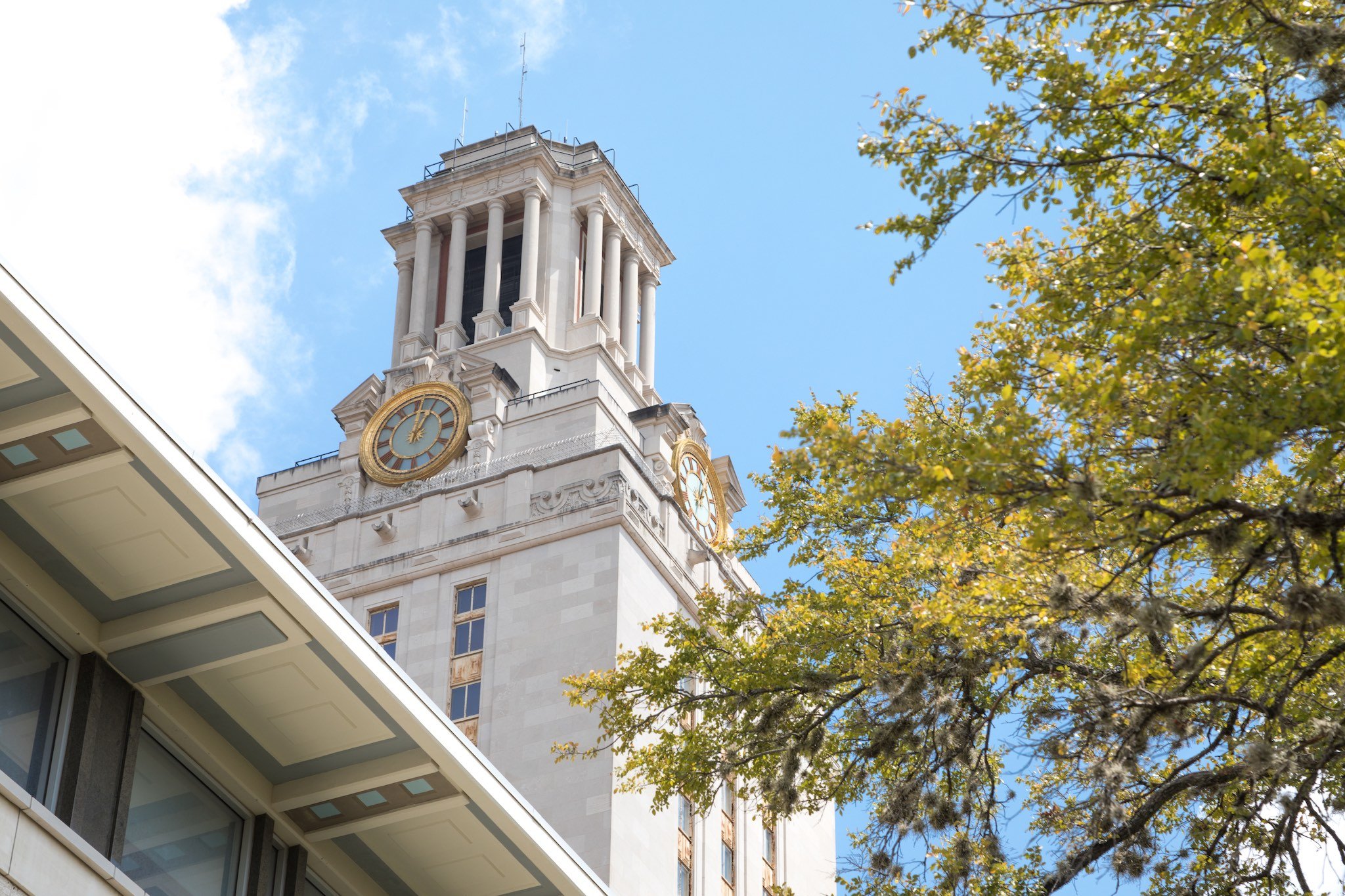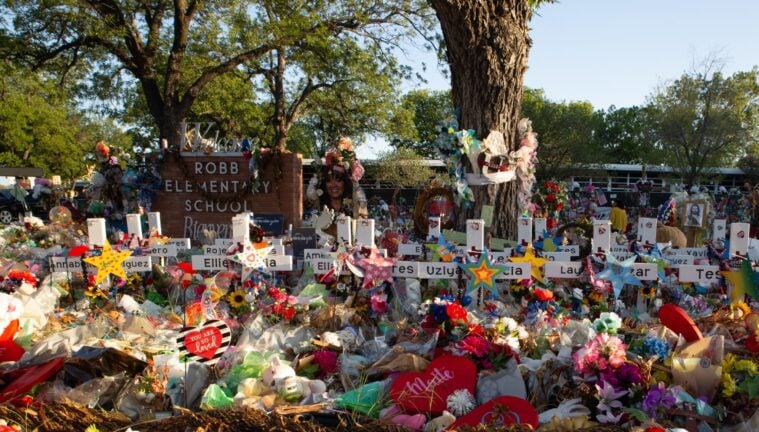Booking to Denton

A version of this story ran in the May 2012 issue.
In downtown Denton, in an old opera house painted purple, Don Foster nurtures his passion: Recycled Books. His bookstore is musty. The handmade bookshelves are rickety. The pale yellow linoleum floors are stained and cracking.
This three-story historic building in Denton’s downtown square houses one of the largest collections of used books in the state, putting the North Texas city, less than an hour from Dallas, on the map of bibliophiles and booksellers nationwide. Recycled Books’ website proclaims: “Serving Denton, Texas, and the world since 1983.”
“The store draws people from all over,” says Kim Phillips, vice president of the Denton Convention and Visitors Bureau. One book lover in particular stands out, she says: “Larry McMurtry is known to come and hunt the shelves.”
Foster says his collection of 400,000 books is second to the number of titles found at the famed Texas novelist’s antiquarian bookstore in Archer City, about two hours away. McMurtry’s books fill four buildings in his hometown.
The stock at Recycled Books, which ranges from the commonplace to the esoteric, is a tribute to Foster’s eclectic taste. A journey through the 17,000-square-foot store’s maze of rooms and hidden alcoves reveals a menagerie of books and music. A 1930 yearbook from Texas Christian University; an original 1977 Never Mind the Bollocks, Here’s the Sex Pistols vinyl record; The Everything Vampire Book; and a first edition of Stephen King’s Carrie.
“We’re not going to get rich, for sure,” says Foster, a longtime Denton resident. But Recycled Books has become a local institution, contributing to the evolving image of Denton—home to the University of North Texas and Texas Woman’s University—as artsy and even a little bit funky, says Julie Glover, of the city’s economic development office.
“[Recycled Books] has helped develop the scene that is going on in downtown now,” she says. “It’s a testament to the funkiness of Denton.”
The purple bookstore shares the square with hip boutiques, antique shops and trendy restaurants. A large mural on the side of the building looks like a psychedelic forest in Never Never Land. On a recent weekend a pink-haired couple strolled down the sidewalk.

“Books and music have always been my thing,” says Foster, 64. In junior high he came across a record by poet Lawrence Ferlinghetti. “The record had a big scratch on it but I could still hear it.”
The poetry paved the way for Foster’s appreciation of the Beats, and later Bob Dylan. He’s been a book and record collector ever since. At home, he has several rooms dedicated to his own collection of more than 1,000 books.
But the college English major didn’t open the bookstore; his ex-wife did. “I never had the nerve to do it myself,” he says. She used a $20,000 inheritance to open the store.
The couple chose Denton because of its proximity to the two universities. When they divorced, Foster wanted to continue the bookstore and his ex-wife wanted to do other things. So he bought her out. That was more than 15 years ago.
In 1990, Foster moved his shop into the three-story former opera house. At first, “all of our stuff fit on the first two floors,” Foster remembers. “After that, it just went crazy.”
Foster bought out two bookstores that were closing in Fort Worth and started amassing a collection of art books from students, professors and other creative types. Today, he travels around the country buying up collections of books, CDs and records. “Last year, we bought 10,000 CDs from a guy in Austin,” he says.
Sometimes, following the books means buying from estates, which can be tough. “If it’s someone you know that died, you feel like a ghoul,” Foster says. But estates have some of the best collections, like the hundreds of poetry books Foster bought last year.
Soft-spoken with a wild puff of white hair, thin and easygoing, Foster fits in well with the store he helped create.
Foster’s book-buying philosophy is more like a fancy sit-down dinner than a quick drive-through window. He spends time and money to acquire high-quality items and waits—sometimes for decades—to sell them. It’s a different business model from that of used-book stores like Half Price Books, which tries to maintain a constantly moving inventory, says Foster.
But that’s what makes the store popular among book lovers. The Used Book Lover’s Guide to the Central States writes that Recycled Books is “not to be missed no matter how far you may have to drive to get there.”
Foster says, “People drive from Austin and even the Midwest to sell us stuff—they come long distances to buy, too.”
Recycled Books gives the seller about 15 percent of the book’s original price. CD, DVD and vinyl record prices vary depending on condition, but it’s still close to that same percentage. The store also has an expansive collection of rare books on the second floor in a section that still has its original hardwood floors. Sexual Behavior in the Human Male by Alfred Kinsey, Wardell Pomeroy and Clyde Martin is nestled with V. by Thomas Pynchon.

Part of Recycled Books’ appeal is its location: a converted opera house that could easily be the subject of one of Foster’s 400,000 books. Listed on the National Register of Historic Places in 1999, the building alone attracts visitors, says Glover, of the city’s economic development office.
“It’s certainly a landmark, especially since they painted it purple,” she says.
For the record, Foster opposed the owners’ decision to do so.
“In the early 1990s, two young men bought the building,” explains Peggy Capps, former chairwoman of the Denton County Historic Landmark Commission. “They didn’t really like the Denton building codes … sort of in a protest they decided to paint the building purple.”
The opera house is a Denton icon, Capps says. And “ever since it’s been built, it’s been an important part of the economy.”
Constructed in 1899, Wright Opera House was a venue for light opera, melodrama and vaudeville, drawing crowds from across North Texas. It seated 1,000 and cost $25,000 to build. It was constructed with bricks salvaged from Denton’s old courthouse, which burned down following a lightning storm in 1894.
At its first show, in February of 1900, according to the Denton Record-Chronicle, horse-drawn carriages delivered ladies in lavish gowns and men in dashing dark suits to what was billed as Denton’s most prestigious entertainment venue. William Wright, the opera house’s namesake, wanted to create a center of culture. Today, Foster has a similar purpose for the space.
Recycled Books hosts live music. A couple of years ago, local musician Sarah Jaffe performed in one of the alcoves in the science fiction section on the second floor. Kaleo Kaualoku, one of a handful of full-time employees and lead singer and guitarist of the indie-rock band Spooky Folk, says the store tries to be supportive of the local music scene. Kaualoku is in charge of the local music section of the store, which includes about 500 CDs, records and cassette tapes. (Overall, the store boasts 16,000 CDs and 7,500 LPs in its collection.)
Foster says there are a lot of people out there who collect books and music. “If you’re into this stuff, you’re selling books to buy your favorite music,” he says. “Then suddenly, you’ll find books you want and you’ll start selling music to buy those books. It just goes back and forth. I’m in the book phase right now.”
At the front of the store, Miles Foster, Don’s wiry, 22-year-old son, is working the register in a T-shirt, jeans and tennis shoes. He’s ringing up a young hipster in green skinny pants and black flats. She carries out a box of books. Then a guy in coveralls and a top hat walks by. The feather sticking out of his hat is iridescent.
A lot of college students shop and sell at Recycled Books, adding to its eclectic inventory. But some of the store’s most interesting items can be found online, as well as in the store, Foster says. The store sells thousands of books, CDs and vinyl records at Amazon.com. “We’ve sold things for big money online that we couldn’t sell for five or six bucks in the store,” he says.
Yet there’s no online inventory of the books in the store. Most books “just come and go too fast” to keep them listed, says Foster, who is wrestling with making his business more Web-friendly.
In the days of Kindles and pocket-sized computers, the corner bookstore is having to evolve technologically. Foster realizes that his livelihood and his passion depend on new digital media. Still, he argues that holding a real book in your hand is a more pleasurable experience than looking at one on a screen. From the looks of the store’s steady stream of customers—most content to browse for unanticipated treasures—he seems to have a point.
Miles will take over the store when his dad retires. “Maybe we could do a little bit more to get into the Internet age,” he muses, referring to doing more book trading online.
But Miles thinks his dad has built something great. Why change it?
After almost 30 years in business, Don Foster has built more than a bookstore, his son says. “It’s kind of a cultural Mecca.”
Fort Worth-based freelancer Sarah Angle has written for national and regional publications.


